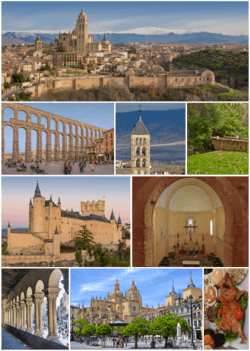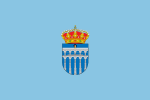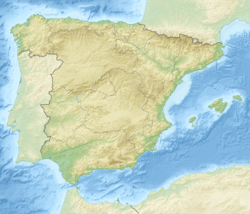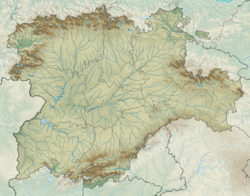Segovia facts for kids
Quick facts for kids
Segovia
|
|||
|---|---|---|---|
 |
|||
|
|||
| Country | Spain | ||
| Autonomous community | Castile and León | ||
| Province | Segovia | ||
| Area | |||
| • Total | 163.59 km2 (63.16 sq mi) | ||
| Elevation | 1,005 m (3,297 ft) | ||
| Population
(2018)
|
|||
| • Total | Lua error in Module:Wd at line 1,575: attempt to index field 'wikibase' (a nil value). | ||
| Demonym(s) | Segovian | ||
| Time zone | UTC+1 (CET) | ||
| • Summer (DST) | UTC+2 (CEST) | ||
| Postal code |
40001-40006
|
||
| Official language(s) | Spanish | ||
Segovia is an amazing city in Spain. It is located in the central part of the country. This historic city is part of the Castile and León region. Segovia is also the capital of the Province of Segovia. It is famous for its incredible old buildings. Many of these buildings are recognized worldwide.
Contents
Discover Segovia's History
Segovia has a very long and interesting past. People have lived here for thousands of years.
Ancient Roman Times
The city was very important during the Roman Empire. The Romans built many things here. Their most famous creation is the huge aqueduct. It brought water to the city.
Medieval Segovia
After the Romans, different groups lived in Segovia. The city grew a lot in the Middle Ages. It became a center for trade and wool production. Kings and queens often visited Segovia. They built beautiful castles and churches.
Jewish and Christian Communities
During medieval times, Segovia was home to different cultures. Jewish, Christian, and Muslim people lived together. They built their own places of worship. This mix of cultures made Segovia very rich and diverse.
Amazing Landmarks to See
Segovia is like an open-air museum. It has three main attractions. These are the Roman Aqueduct, the Alcázar, and the Cathedral.
The Roman Aqueduct
The Aqueduct of Segovia is a giant stone bridge. The Romans built it about 2,000 years ago. It carried water from a river to the city. What's amazing is that it has no mortar. The stones are perfectly balanced. It is still standing strong today. It is one of the best-preserved Roman aqueducts.
The Alcázar of Segovia
The Alcázar of Segovia is a stunning castle. It looks like something out of a fairy tale. It sits on a rocky hill. The castle has towers, turrets, and a moat. It was once a royal palace. Many Spanish kings lived here. It also served as a prison and a military academy. You can explore its rooms and climb its towers. The views from the top are incredible.
Segovia Cathedral
The Segovia Cathedral is a huge church. It is often called the "Lady of the Cathedrals." It was built in the Gothic style. This means it has tall spires and stained-glass windows. Building it took a very long time. It started in the 16th century. The cathedral is a masterpiece of architecture. Inside, you can see beautiful altars and artwork.
Life in Segovia Today
Segovia is a lively city. About 50,000 people live there. It is a popular place for tourists. People come from all over the world. They want to see its famous landmarks.
Local Government
The city has a mayor who leads the local government. The current mayor is Clara Luquero. She is part of the PSOE party. The local government helps manage the city. They work on things like public services and city planning.
Education and Culture
Segovia has universities and schools. It is a place where students come to learn. The city also has many cultural events. There are festivals, concerts, and art exhibits. Its rich history makes it a great place for learning.
Food and Traditions
Segovia is also known for its delicious food. One famous dish is roasted suckling pig. It is a traditional meal. The city also celebrates many local festivals. These often include parades and music.
Images for kids
-
View of the Alcázar of Segovia (1838).
-
The Alcázar de Segovia.
-
Facade of the Cathedral night view.
See also
 In Spanish: Segovia para niños
In Spanish: Segovia para niños
 | Claudette Colvin |
 | Myrlie Evers-Williams |
 | Alberta Odell Jones |



















